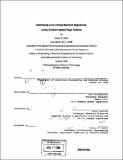Optimizing live virtual machine migrations using content-based page hashes
Author(s)
Stultz, Jacob A
DownloadFull printable version (11.93Mb)
Other Contributors
Massachusetts Institute of Technology. Dept. of Electrical Engineering and Computer Science.
Advisor
Carl Waldspurger and Larry Rudolph.
Terms of use
Metadata
Show full item recordAbstract
Virtualization systems such as VMware ESX Server use content-based page hashing to help identify duplicate memory pages within virtual machines. Such duplicate pages, once identified, can then be mapped copy-on-write to a single page in physical RAM, thus saving memory in a manner that is transparent to the virtual machine. The page hashes that are collected in this process can be further utilized. This thesis demonstrates how these page hashes can be used to reduce the time required to migrate running virtual machines from one physical machine to another. Normally, this is done by sending the virtual machine state and all memory contents from the source to destination machine. However, since some memory pages may already be present on the destination, it is possible to reduce the number of pages sent (and therefore total migration time and bandwidth used), by sending only a compact hash instead of the full contents for each page likely to be present on the destination machine. This thesis accomplishes this by creating a database of canonical or "standard" pages to determine which pages can be safely sent as only a hash. Tests of the system demonstrate up to 70% reduction in migration time in idealized workloads, 40% reduction in some realistic workloads, and minimal slowdown in some pathological cases.
Description
Thesis (M. Eng.)--Massachusetts Institute of Technology, Dept. of Electrical Engineering and Computer Science, 2008. Includes bibliographical references (p. 55).
Date issued
2008Department
Massachusetts Institute of Technology. Department of Electrical Engineering and Computer SciencePublisher
Massachusetts Institute of Technology
Keywords
Electrical Engineering and Computer Science.